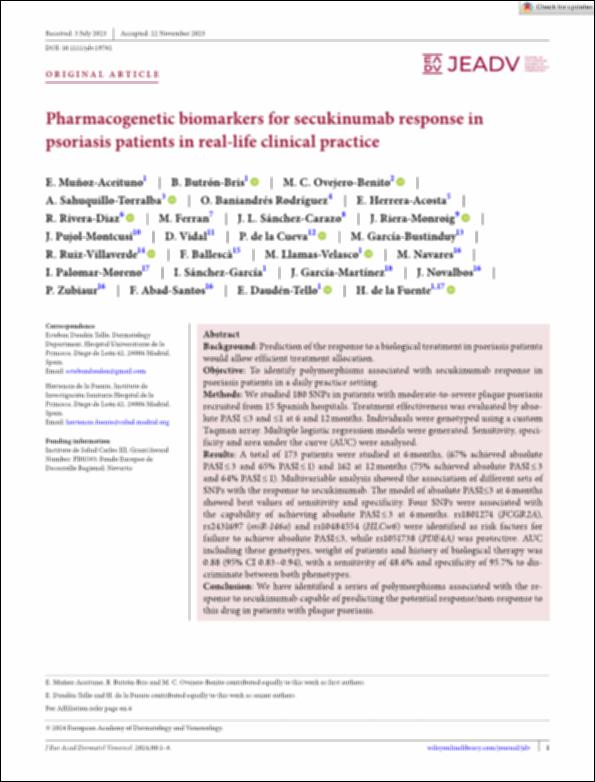Por favor, use este identificador para citar o enlazar este ítem:
http://hdl.handle.net/10637/14827Pharmacogenetic biomarkers for secukinumab response in psoriasis patients in real-life clinical practice
| Título : | Pharmacogenetic biomarkers for secukinumab response in psoriasis patients in real-life clinical practice |
| Autor : | Muñoz Aceituno, Ester Butrón Bris, B. Ovejero Benito, María del Carmen Sahuquillo Torralba, Antonio Baniandrés Rodríguez, O. Herrera Acosta, E. Rivera Diaz, R. Ferran, M. Sánchez Carazo, José Luis Riera Monroig, J. Pujol Montcusí, J. Vidal, D. Cueva, P. de la García Bustinduy, M. Ruiz Villaverde, R. Ballescà, F. Llamas Velasco, Mar Navares, Marcos Palomar Moreno, I. Sánchez García, Irene García Martínez, Jorge Novalbos, J. Zubiaur, Pablo Abad Santos, Francisco Daudén, Esteban Fuente, H. de la |
| Materias: | Pharmacogenetic; Psoriasis |
| Editorial : | Wiley |
| Citación : | Muñoz-Aceituno E, Butrón-Bris B, Ovejero-Benito MC, Sahuquillo-Torralba A, Baniandrés Rodríguez O, Herrera-Acosta E, Rivera-Diaz R, Ferran M, Sánchez-Carazo JL, Riera-Monroig J, Pujol-Montcusí J, Vidal D, de la Cueva P, García-Bustinduy M, Ruiz-Villaverde R, Ballescà F, Llamas-Velasco M, Navares M, Palomar-Moreno I, Sánchez-García I, García-Martínez J, Novalbos J, Zubiaur P, Abad-Santos F, Daudén-Tello E, de la Fuente H. Pharmacogenetic biomarkers for secukinumab response in psoriasis patients in real-life clinical practice. J Eur Acad Dermatol Venereol. 2023 Dec 28. doi: 10.1111/jdv.19782 |
| Resumen : | Background: Prediction of the response to a biological treatment in psoriasis patients would allow efficient treatment allocation. Objective: To identify polymorphisms associated with secukinumab response in psoriasis patients in a daily practice setting. Methods: We studied 180 SNPs in patients with moderate-to-severe plaque psoriasis recruited from 15 Spanish hospitals. Treatment effectiveness was evaluated by absolute PASI ≤3 and ≤1 at 6 and 12 months. Individuals were genotyped using a custom Taqman array. Multiple logistic regression models were generated. Sensitivity, specificity and area under the curve (AUC) were analysed. Results: A total of 173 patients were studied at 6 months, (67% achieved absolute PASI ≤ 3 and 65% PASI ≤ 1) and 162 at 12 months (75% achieved absolute PASI ≤ 3 and 64% PASI ≤ 1). Multivariable analysis showed the association of different sets of SNPs with the response to secukinumab. The model of absolute PASI≤3 at 6 months showed best values of sensitivity and specificity. Four SNPs were associated with the capability of achieving absolute PASI ≤ 3 at 6 months. rs1801274 (FCGR2A), rs2431697 (miR-146a) and rs10484554 (HLCw6) were identified as risk factors for failure to achieve absolute PASI≤3, while rs1051738 (PDE4A) was protective. AUC including these genotypes, weight of patients and history of biological therapy was 0.88 (95% CI 0.83-0.94), with a sensitivity of 48.6% and specificity of 95.7% to discriminate between both phenotypes. Conclusion: We have identified a series of polymorphisms associated with the response to secukinumab capable of predicting the potential response/non-response to this drug in patients with plaque psoriasis. |
| URI : | http://hdl.handle.net/10637/14827 |
| Derechos: | http://creativecommons.org/licenses/by-nc-nd/4.0/deed.es openAccess |
| ISSN : | 1468-3083 |
| Fecha de publicación : | 2023 |
| Centro : | Universidad San Pablo-CEU |
| Aparece en las colecciones: | Facultad de Farmacia |
Los ítems de DSpace están protegidos por copyright, con todos los derechos reservados, a menos que se indique lo contrario.


